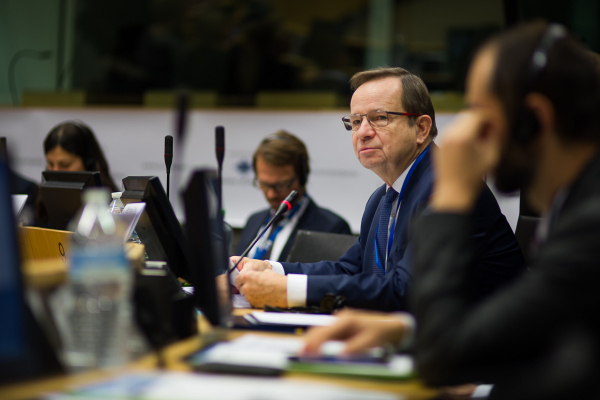President of Poland’s Podkarpackie Region Władysław Ortyl becomes Chairman of Carpathians interregional group

Władysław Ortyl, Marshal of the Podkarpackie Region of Poland is chairing the new Carpathians interregional group bringing together local and regional politicians from the European Committee of the Regions to address common challenges.
Marshal Ortyl, who recently had his membership status to the Committee of the Regions changed from alternate to full member, has led the establishment of a new interregional group on the Carpathians.
Commenting on his appointment as a full member of the EU's Committee of the Regions, Marshal Ortyl said: "I am honoured to be continuing my work for the ECR Group as a full member of the European Committee of the Regions. As a new member, I look forward to being more involved in the opinions that all tiers of local and regional government from across the EU prepare on EU legislation.
"I look forward to further raising the views of local citizens from my Podkarpackie region in Poland, and treat this nomination as both a privilege and a commitment", said Marshal Ortyl. Poland has 16 regions called Voivodeship's, which are presided over by a Marshal. The Podkarpackie region is the region where the Marshal is from the ECR affiliated Law and Justice Party, currently also in national government.
"In my work I intend to focus on, among other things, the future of cohesion policy. I find it particularly important to ensure that decisions on how to spend EU funds are taken as close as possible to the citizens and that those funds are spent efficiently.
"Among his initial tasks, Marshal Ortyl participated in the first meeting of the new interregional group 'Carpathians', for which he was confirmed as chairman. The group, set up in February 2016, aims to investigate the possibility of creating a Carpathian macroregional strategy in the mountainous region, which stretches west to east from the Czech Republic to Romania, going through Slovakia, Hungary, Serbia, Poland and the Ukraine. The area is famed for its great beauty and ecological value, as well as the source for a number of major rivers.
Developing the region's economic, cultural and ecological policies through sustainable development is of highest importance, with the interregional group also promising to promote a multilevel governance approach to development of the Carpathian strategy.
Marshal Ortyl presented the plans to members at the meeting on 8 December 2016. Other local and regional politicians attending the Carpathian interregional group included Alin Nica, Head of the Romanian national delegation at the CoR and József Ribányi, Head of the Hungarian national delegation. During the 8 December meeting, other perspectives were offered from an associate of the Carpathian Convention and Harald Egerer from the UN Environment Europe's Vienna Office.
Mr Adrian Ovidiu Teban (Mayor of Cugir in Romania) and Mr Oszkár Seszták (President of County Council of Szabolcs-Szatmár-Bereg Megye in Hungary) were elected Vice-Chairmen of the Intergroup.
Speaking at the meeting, Marshal Ortyl said: "It's a privilege for me to be opening the first session of the Carpathians as chairman of the CoR's new interregional group to promote a modern development strategy to strengthen this important mountainous region in Europe."
"By sharing best practices and working together with my colleagues from across seven countries, I believe we can help the region's economy flourish whilst still protecting its valuable ecology and environment."
All present members agreed that in order for the group to strengthen international cooperation in line with the Carpathian Convention, some meetings should take place externally from Brussels in order to involve as many local and regional representatives as possible. A proposal for a meeting in Romania later this year has been made, alongside an already planned meeting in Brussels in March 2017.
As one of Europe's largest mountain ranges, the Carpathian Convention was signed in May 2003 by seven Carpathian states (Czech Republic, Hungary, Poland, Romania, Serbia, Slovak Republic, Ukraine) to foster the sustainable development of the area.

